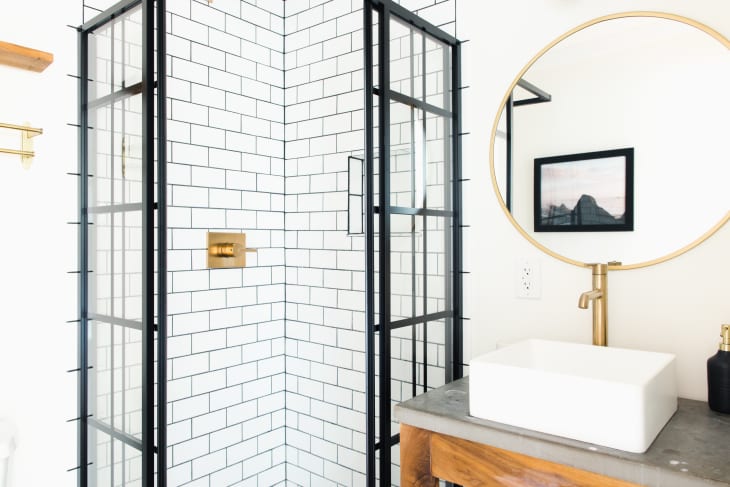8 Pro Tips for Hiring a Home Improvement Contractor

The right renovation can really increase the value of your home, but it’s an expensive and time-consuming process. Besides setting aside the necessary funds, the first big hurdle is deciding how you’re going to tackle the project.
Although some talented folks may attempt to DIY, the vast majority is better off seeking out the help of a general contractor for big projects—bathroom updates and kitchen remodels, for example—or additions.
Unfortunately, finding the right professional for the job isn’t always as simple as conducting a quick Google search. Sometimes personalities don’t mesh and sometimes a contractor just isn’t reliable or—worse—is unqualified for the job.
To help you weed out the duds, we asked great contractors to point out some red flags.
1. They seek you out
“Be wary of door-to-door contractors,” says Los Angeles-based contractor and designer Justin Krzyston. Though you may encounter legitimate contractors trying to build a business, the Better Business Bureau cautions that many door-to-door contractors are unlicensed, uninsured, and unqualified. Make sure anyone you choose to work with is licensed, properly insured, and bonded, says Krzyston. “The best way to begin your search for a contractor is to ask your neighbors and friends. A referral will help you feel safe and secure when trusting someone with your home.”
2. They don’t have adequate references
“The most important reference and marketing a contractor can have is satisfied past customers and images of the work to support it,” says Joseph Cohen, owner of First Touch Construction in Los Angeles. Call a contractor’s references to ensure the person you hire will be professional, prompt, and offer outstanding customer service. And if you’re doing say, a bathroom remodel, make sure to talk to someone who has received that same service. “Each [space of the house] is different and complex for its own reasons, and you want someone who understands the nuances of each area.”
3. They don’t have the right credentials
“It’s critical they are insured,” says Jeff Neal, a project manager with Penn Coat Inc. “What happens if they cause severe damage to a roof? Or flood the bathroom? If the contractor doesn’t have liability insurance to cover their mistakes, then it’s unlikely they have the money to fix it out of their own pocket.” Unfortunately, that means you could be stuck with a bill or a hefty home insurance claim. It’s simply not worth the risk.
4. They give a quote on the spot
“When contractors give a quote on the spot, it’s usually not the best estimate, as it’s not thoroughly thought out,” says Cohen. Sometimes a contractor will offer an estimated fee, he adds. But that can lead to a higher fee, since the contractor has to ensure their costs are covered. Ideally a contractor will give a price only after they’ve considered the full picture in terms of the complete project, finishes, and other additional repairs.
5. They won’t draft a contract
“A contract is the agreement that the customer and the contractor have before starting the project,” says Neal. A contract is meant to protect both parties. “Read through the contract thoroughly and make sure it includes the necessary details.” If it’s vague, ask for more clarity before the project begins. If the contract isn’t thorough and the scope of work changes during the project, you could end up with unexpected charges. “The worst outcome is finding out at the end of the project that the wrong paint color was used to paint the house, or that the cabinets were installed on the wrong side of the kitchen, or that the new addition isn’t big enough to fit the custom-built kitchen island from Italy.”
6. They ask for the fee upfront
“Anyone who asks for the majority of the fee upfront should raise concerns,” says Cohen. “Payments should be made on a fee schedule and the client should be billed upon the completion of work in phases, or per the schedule.” Always make sure that the work has been completed to satisfaction for a specific phase before making a payment. The exception? The initial fee, which can be about 10 percent of the full cost of the project.
7. They say you don’t need permits
“Pulling a permit requires a licensed, bonded, and insured contractor,” says Cohen. “If someone is wary of pulling a permit when necessary, it’s a red flag in regards to their professional credibility, which may mean they don’t have the proper licensing or coverage.” The permit process is put in place to ensure the construction is done properly, he adds. “It’s an extra layer of protection for the client, as the city/county office needs to sign off on the work to ensure it’s correct, safe, and up to code.”
8. They don’t have the right equipment or run a dirty job site
“This is a sign that you’re dealing with an inexperienced contractor or someone that’s moonlighting,” says Neal. “The contractor should have their own tools and equipment, and they should have good housekeeping practices. If the contractor is messy and leaves their tools and hardware all over the area, then that’s a sign of poor organization, which will most likely reflect in his work.”